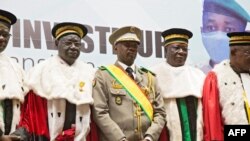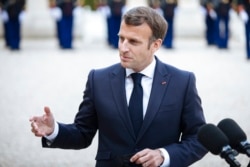A promise Monday by Mali’s new interim president to hold democratic elections by early next year appears to meet some conditions set by France to resume recently suspended cooperation with Malian forces. But some hope Paris is slowly heading for the exit when it comes to its yearslong Barkhane anti-terrorist operation in the Sahel.
France’s announcement last week that it was halting counterinsurgency cooperation with Malian forces followed Mali’s second coup in less than a year. President Emmanuel Macron denounced the power grab as unacceptable, warning also he would pull French troops from Mali altogether if it tipped to radical Islam.
Sworn in as Mali’s latest interim president days later, junta leader Assimi Goita vowed to preserve his country’s democratic gains and meet promises to hold elections by next February. Not everyone believes him.
“I think Goita is trying to reassure the international public opinion and international partners," Sambe said. "But in the meantime, since the first transition, we see the military tried to keep themselves in power. And the last coup is an illustration of this.”
Bakary Sambe is director of the Timbuktu Institute research group. He said while Goita and his military junta are under pressure, so, too, is Macron, as he eyes next year’s presidential elections at home and sharpens his anti-terrorism rhetoric. Support for keeping France’s eight-year-old, 5,100-man Barkhane anti-terrorism operation in the Sahel is fading — both in France and in the countries where it operates, as anti-French sentiment is mounting.
Meanwhile, Sambe said some Malians support Goita and the idea of holding talks with at least some armed groups in the country, which France rejects.
“Venturing sanctions against the junta will be perceived as a double punishment against the Malians, who already doubt the effectiveness of the action of the international community which has neither defeated terrorism nor stabilized Mali,” Sambe said.
Meanwhile, here in France, some hope the suspension of cooperation with Mali’s army will be a first step to a bigger drawdown and eventual French military exit from the Sahel — a vast area edging the Sahara Desert that is rife with instability. Others said they aren’t sure of what will happen.
French anti-terrorism specialist Marc-Antoine Pérouse de Montclos said no other forces in the region can take France’s place. Meanwhile, he told France’s TV5 Monde channel that militants are profiting from the security void. And, he notes, Mali isn’t France’s only partner in the Sahel counterinsurgency effort. A broader, so-called G-5 Sahel coalition also includes Mauritania, Chad, Niger and Burkina Faso.
A case in point is Burkina Faso, where suspected Islamist militants killed at least 160 people early Saturday. French Foreign Minister Jean-Yves Le Drian heads to Ouagadougou this week to show France’s solidarity — illustrating the bigger ties binding France to a complicated conflict.





